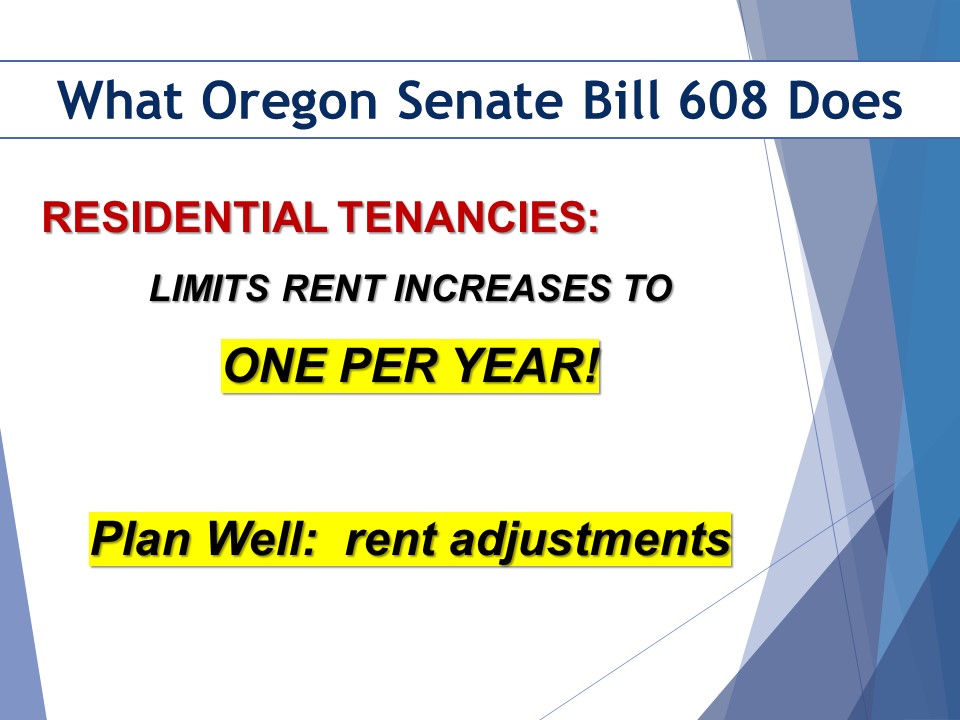Since there have been landlords, there have been troublesome tenants. It’s just a part of things. The new Oregon Rent Control Senate Bill 608 has an impact on how multifamily property owners can deal with these tenants. Real estate and property management attorney Brian Cox provides insight into the new law and strategies for how to handle these situations as well as rent increases.
[embedyt]https://www.youtube.com/watch?v=xBA3fClkaF4[/embedyt]
Watch or Read
Before the new law we used to solve the problem of troublesome tenants by saying something like this: “You really didn’t create the kind of trouble where I had a statutory basis to kick you out, but man, all the other tenants hate you.” Or, “Man, I do know what those five-minute stops with 30 of your friends in an hour means.” Those are just two examples where you might decide to take action to move a tenant out without ruining their rental record, and to do that you’d give them a no-cause notice.
With the new law, that strategy no longer is available. Now you have to renew that lease or let it roll over into a month-to-month unless that tenant causes three separate violations during that 12-month period, and it’s a rolling 12 months. What you do is, at the third violation, you give them a 90-day notice that you’re not going to renew their tenancy. That tells them that now you don’t have to renew and you don’t have to pay. They just have to go at the end of that 90 days.
The type of violations you can give notices for are all the things that you’ve ever given notices before that are laid out in chapter 90: when people don’t pay their rent, when they have animals they’re not supposed to have, when they move somebody in who is not supposed to be there, when they’re not paying their late fees, the for-cause notices. All the different reasons why we could give people notices under statute fall into the count, and the notices don’t have to be the same three reasons. It could be any three reasons.
Using Notices as a Strategy for Troublesome Tenants
The other reasons are all the different ways our tenants violate their lease. With the new law my strategy for landlords is to start noticing your tenants for every violation. That doesn’t mean you need to terminate them, but it means you’ve got yourself locked and loaded, and if you want to terminate them, that choice is available to you. This goes against my personal belief system, but it’s an unintended consequence of this new law.
The biggest single opportunity that comes to mind is rent payments. If you have a number of properties, I’m going to guess that probably half your tenants actually pay by the first day of the month and most of the tenants pay before they hit the late fee, the fifth day of the month. But their rent is due on the first day. If that tenant doesn’t pay by the first, you give them a warning notice on the second. Three notices within 12 months, they’re now eligible for a no-cause eviction notice. In this case, it works.
You have limitations on giving these people notices. Your right to give no cause, unless it resets, for some reason, like you change a configuration of the housing, they change it. And I don’t mean when the kids move out. I mean when the tenants on the contract change. Those are examples of how the Senate bill changes things. For most people, if you have stable housing, it doesn’t change a lot of problems except for the folks maybe you wanted to move out who create the weird problems or too much noise at night or make all your neighbors mad.
 The other part of the Senate bill is how it affects your ability to raise rent. There are several parts to this, and one is that you can only do rental raises once a year with your existing tenants, and you can only do rental raises at rollover, at a turnover from tenant to tenant when you didn’t create that turnover yourself by giving a no-cause eviction notice. In other words, you can’t create your own situation to get outside of the rent cap.
The other part of the Senate bill is how it affects your ability to raise rent. There are several parts to this, and one is that you can only do rental raises once a year with your existing tenants, and you can only do rental raises at rollover, at a turnover from tenant to tenant when you didn’t create that turnover yourself by giving a no-cause eviction notice. In other words, you can’t create your own situation to get outside of the rent cap.
I talk with many property owners who have tenants paying four, five, six hundred dollars under market; this happens quite a lot. There are two main reasons. One sounds like this: “Hey, she’s a great tenant. She’s been there for 10 years. I never have to touch the unit. I’m going to rent to her at the same rent I gave it to her 10 years ago.” The other way it happens, is like this: “Hey, we had a whole deck collapse and I had to exclude the tenant from the backyard, so we knocked their rent down for $500 a month. We just built a new deck. We’d like to raise the rent back up $500 to market. Can I do that?” Someone called me with a scenario like this. And the answer was no. They started the deck before they knew about rent control.
You have to plan your rent adjustments. If your property is already properly marketed and rented now, then the 10.3 percent is not going to get in your way of making a good return on your property. But if it’s not, then it could be an issue.
 If you need a real estate attorney, contact Brian Cox.
If you need a real estate attorney, contact Brian Cox.
If you want to learn more about the impact of Oregon Senate Bill 608, visit Pacwest Commercial Real Estate’s Oregon Rent Control Central for the latest information.
Disclaimer
Due to the complex nature of these changes, Landlords should contact an attorney with any questions or clarification of Oregon Rent Control SB 608.


Recent Comments